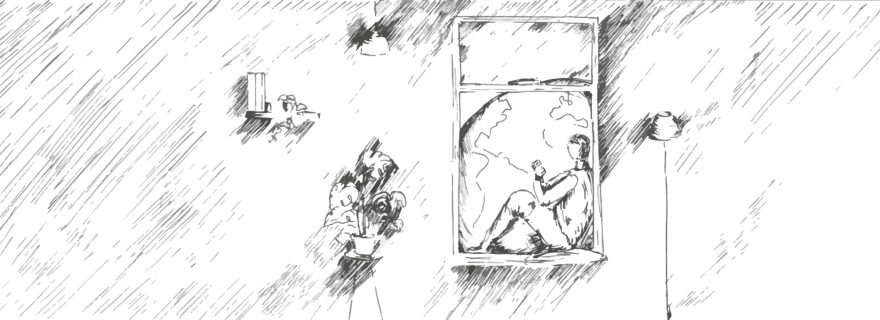Eco-Emotions: The Tolls of a Changed Earth
Felix sits at his open window. He cannot sleep, his head hurts. Heat waves are nice on a holiday, but the architecture of his home was not built for them and tomorrow he has work. Dread sets in his throat.
In an attempt to distract himself, he picks up his phone. His sister has texted, but the woods on her hills are burning, and seeing the photos turns his stomach. He knows the morning news will tell similar stories, elsewhere but everywhere, on an Earth that was not as volatile when he was growing up, or even two summers ago.
Felix’s feelings of distress do not stand alone. It is becoming increasingly clear that the climate crisis is taking a toll on the mental health and psychological well-being of our societies. So much so that a whole field of research has recently appeared to study the emotions associated with climate change.
‘Eco-emotions’ attempt to describe our lived experiences of environmental change, and cover anxiety, paralysis, guilt, grief, anger, and nostalgia, amongst others.
Psychologists and behavioural scientists study the phenomena to understand the impact of their growing presence in society. They relate eco-emotions to people’s capability for resilience and climate action, not just mental health.
This is because developing different eco-emotions can influence behaviour differently. A study published in the Journal of Climate Change and Health claims that when it comes to climate action, eco-anger is a much more powerful force than those eco-emotions that revolve around eco-anxiety.
Eco-anxiety refers to the specific stress and worry of environmental disaster in the future and is rooted in fear. Eco-anger, in contrast, describes the intense frustrations many feel when faced with the imminence of climate disaster and its consequences also in the present.
In ‘fight-or-flight’ terms, eco-anxiety is associated with ‘flight’ and avoidance of the climate threat, while eco-anger is believed an activating emotion that encourages a ‘fight’ approach.
High levels of anxiety can be debilitating and lead to paralysis, guilt, and depression, which are not considered catalysts of action. Eco-anger is considered a better spurrer of action as it seems to lead to greater engagement in collective pro-climate behaviours, like joining a climate march or voting green.
In this sense, the study of eco-emotions reveals more on our relationship to the natural world, but also how we can harness them to influence our societies.
Some are more vulnerable to their negative effects than others. Eco-anxiety, for example, has a disproportionate impact on children and young people compared to the rest of the population, according to a study published in the scientific journal Sustainability. This is likely because they are the ‘future generations’ that will have to deal with the consequences of current environmental actions and events.
Naturalists and climate scientists are more prone to fluctuating between eco-emotions, but so are those who have actively suffered the effects of climate disasters, such as fires or floods.
“I dedicate my life to the environmental cause and sometimes I still get completely blocked, and then feel guilty on top of it,” said a Leiden University master’s student studying Governance of Sustainability during an eco-anxiety workshop held by their Green Office in mid-October, where similar thoughts were shared.
The future will reveal more on the effects of eco-emotions on our society, but current research prompts warnings about the well-being of populations distressed about climate change.
OTHER COMMON ECO-EMOTIONS
Solastalgia was coined by the psychologist Glenn Albrecht in his book Solastalgia: a new concept in human health and identity and describes the sense of loss, powerlessness and isolation that occur when a home environment begins to gradually disappear in the present moment and in the first person. Its etymology combines the Latin solacium (comfort) and the Greek root -algia (pain, suffering, grief).
Eco-paralysis describes a person’s inability to meaningfully respond to the challenges associated with the climate crisis. It can stem as a consequence of high levels of eco-anxiety.
Eco-guilt relates to the dread people suffer from when they feel they should be doing more to ‘save the planet’ or that they could never do enough. It can come as a result of eco-paralysis and is strongly associated to a person’s ability to follow the social standards of behaviour linked to environmental virtuosity, such as identifying as vegan, or avoiding air travel.
Eco-grief deals with the sadness that stems from ecological loss – in the past, present, or future – to do with either the physical environment or one’s sense of identity. If a forest burns to the ground, those affected might mourn the loss, but also their own personal connection to it.
It is related to eco-nostalgia, which appears when people return to a place they no longer recognise, as a consequence of development or the disasters associated to climate change.






0 Comments